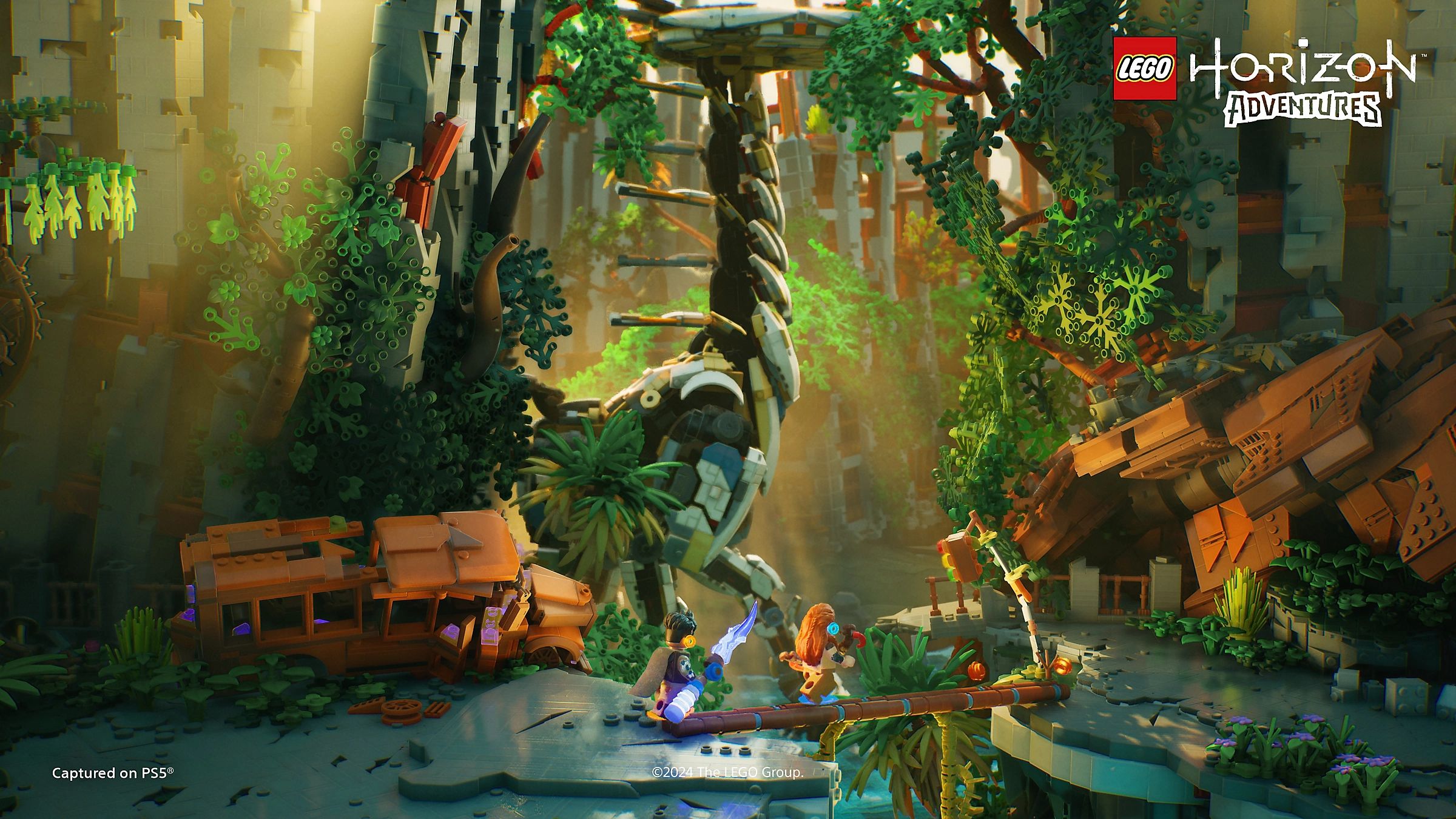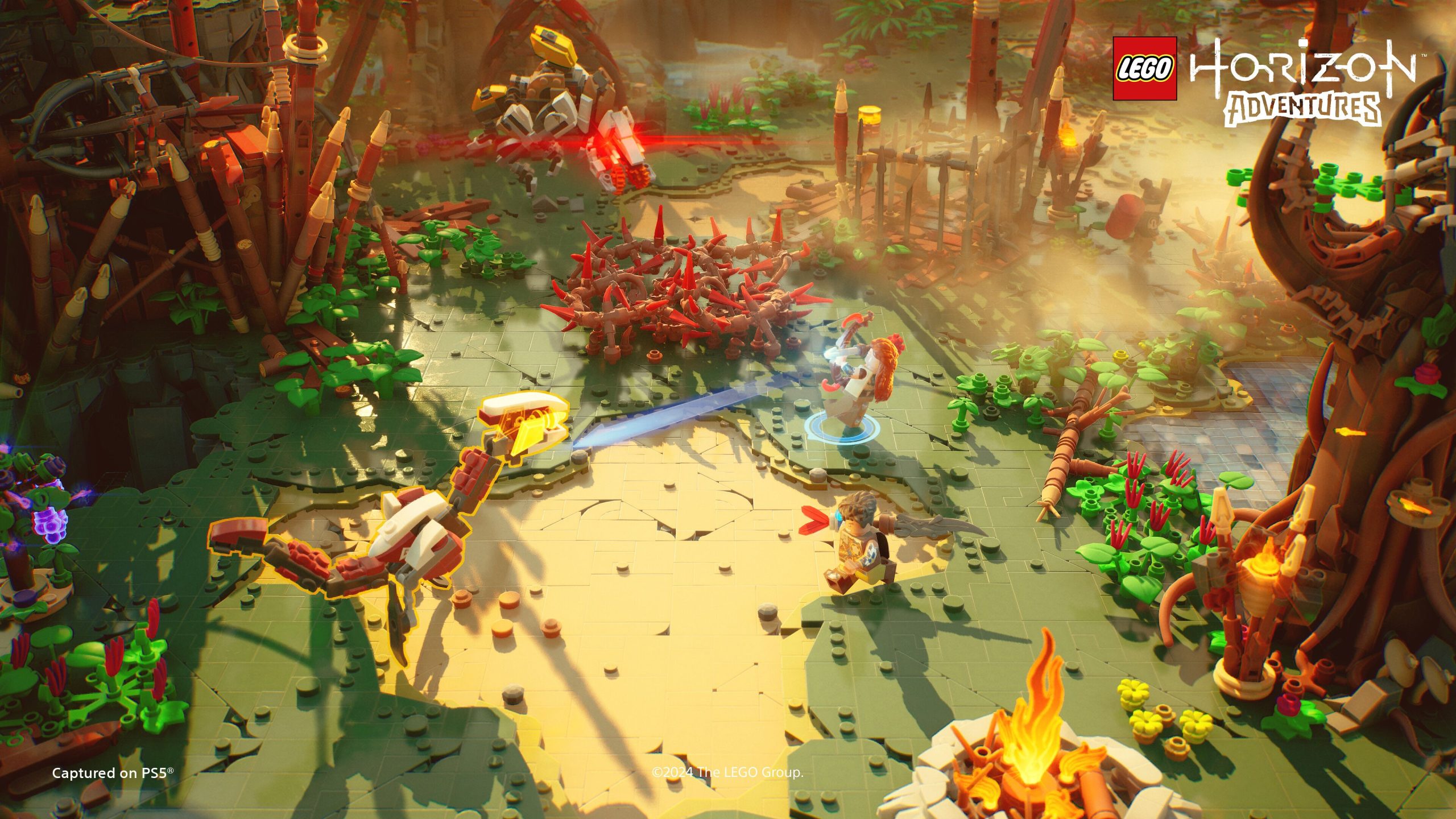A LEGOfied reimagination of Horizon Zero Dawn was something very few (if any) of us could have predicted Sony would end up commissioning, but regardless of your level of admiration for the series, it’s easy to understand why that decision was made- beyond the obvious fact that the Horizon series has been massively successful for PlayStation in the near-decade that it has now been around. Just as important, however, is how well-suited the IP seems – when you put some thought into it, at least – to a side project that attempts to capture the attention of a younger audience while still feeling like itself.
On paper, LEGO Horizon Adventures certainly does make sense then- but is the actual game itself any good? Thankfully, it is. Developed jointly by Guerrilla and Studio Gobo, LEGO Horizon Adventures is a simplified, charming, and colourful take on the original Horizon game that saw Guerrilla Games’ stock shooting through the stratosphere. It successfully boils much of Zero Dawn down to its basics in its attempts to cast a wider net with its target audience, and in addition, also feels like a genuinely enjoyable LEGO game, even if that transition to a more lighthearted tone means it loses several elements that make the original game that this adaptation is based on so memorable.
“LEGO Horizon Adventures successfully boils much of Zero Dawn down to its basics in its attempts to cast a wider net with its target audience, and in addition, also feels like a genuinely enjoyable LEGO game, even if that transition to a more lighthearted tone means it loses several elements that make the original game that this adaptation is based on so memorable.”
Such changes are made throughout the length of the experience, though this obviously won’t come as a huge surprise to anyone who’s grown familiar with LEGO games over the years. No, this doesn’t come from the TT Games side of the LEGO pipeline, but it still does share a lot of its DNA with those games, especially in how it changes its source material as part of its adaptation process. The story follows the same main beats as what Zero Dawn fans will remember, but it gets to those beats in its own way, and at a much more rapid pace. This obviously isn’t a story-focused game in the sense that Zero Dawn was, given its target audience, so that makes sense.
Of course, a lot of the changes are made due to the game’s attempts at keeping a much merrier tone. All of the events of Zero Dawn are viewed through a much more humorous and childlike lens, which means brevity and levity both rule the day, with the original game’s epic post-apocalyptic story being run through a sieve in order to be presented in a much more abridged and cheerful manner. It helps that the humour generally lands rather well, even if the game isn’t often laugh-out-loud funny by any stretch of the imagination. A combination of delightful characters, endearing animations, and consistently solid writing (for the most part) helps it retain its charms for most of its runtime. Oh, and now that Horizon is a LEGO game, Aloy’s chattiness doesn’t feel nearly as grating.
As someone who has extensively played and loves the Horizon games, however, what’s particularly interesting about LEGO Horizon Adventures is how it adapts the universe. In spite of its much more lighthearted take, it somehow manages to capture the essence of Horizon rather well nonetheless, whether that’s because of the beautiful and overgrown environments that you traverse, how true to the source material the machines feel in both their visual design and how they function in gameplay, or the fact that most of the original game’s voice cast has reprised its roles here (with the notable but obvious exception of Sylens, with actor Lance Reddick having sadly passed away last year).
“In spite of its much more lighthearted take, it somehow manages to capture the essence of Horizon rather well nonetheless, whether that’s because of the beautiful and overgrown environments that you traverse, how true to the source material the machines feel in both their visual design and how they function in gameplay, or the fact that most of the original game’s voice cast has reprised its roles here.”
On the gameplay side of things, you can obviously expect a hugely different experience from Horizon Zero Dawn. For starters, LEGO Horizon Adventures is a linear, level-based game, while unlike the mainline series, it also isn’t an action RPG, instead adopting a light combat-driven action-adventure loop that those who’ve played LEGO games in the past will be very familiar with. Some core elements are retained, like using the Focus to highlight enemy weak points that you then target, some basic progression systems that resemble Zero Dawn’s leveling and customization, light stealth mechanics, an emphasis on elemental combat, and of course, the different kinds of machines that you fight, and the unique attributes, strengths, and weaknesses that they each have.
All of that is heavily streamlined and simplified, however. Playing from fixed isometric camera perspectives obviously means aiming and shooting works much differently, while you also no longer have any ammo limitations to worry about (at least with your default attacks). Instead, the focus now is on maintaining distance from enemies, carefully dodging incoming attacks, and finding pockets to dish out your own attacks. That actually ends up working out pretty well, thanks to the controlled chaos that the game creates with its combat encounters.
You’re frequently accosted by different enemy types, or at least by multiple enemies of the same type, and running around the compact battle arenas as you try to take them out always feels enjoyable. It’s worth noting that I played on the Adventurer difficulty, which, based on its description, sounds like your regularly balanced Normal difficulty, but is actually one above the default setting in the game. On this difficulty, I thought the combat struck a nice balance between being fairly straightforward and easy to grasp while still finding ways to push back and challenge the player to use all of the tools at their disposal.
And you do have a fair amount of tools at your disposal. In addition to your default attacks, the game also encourages using the environment to your advantage, from using explosive barrels to goading Broadheads to ram into walls and deal damage to themselves as they try to charge in your direction. Meanwhile, as mentioned, elemental combat is also quite important, whether that’s setting enemies on fire, electrocuting them, or freezing them, which you can do either through objects and elements in the environments, or with special weapons that you find from time to time. Additionally, there are also special gadgets to utilize that come with many different uses, from temporarily freezing enemies in your vicinity, to letting you double jump (while burning everything beneath your boots), and more.

“LEGO Horizon Adventures does a good job of crafting a compelling combat system, in spite of how much it simplifies things. “
On top of all of that, LEGO Horizon Adventures also lets you play as multiple different characters, each with their own play style. Aloy, for instance, is the archer that we all know her as, while Varl can chuck a spear through multiple enemies in a line, and Teersa can lob bombs. All in all, with its elemental mechanics, different weapons and gadgets, multiple playable characters, and of course, its roster of mechanical monstrosities to fight, LEGO Horizon Adventures does a good job of crafting a compelling combat system, in spite of how much it simplifies things.
Things can start feeling a little repetitive at times, however, because of the way the game is structured. As I mentioned earlier, this is a mission-based game, and in terms of the level design, there isn’t much to separate a large number of the missions from each other. Though there is sufficient biome diversity from chapter to chapter, when it comes to the actual design, missions quickly start blending together, an issue that is exacerbated by your main objectives also often being repetitive (if not downright mundane). This is also a heavily-combat focused game, for the most part. Though there is some light exploration to be done during missions, other than small branching paths and the odd hidden area here and there, you don’t get much of a break from the combat.
Between missions, thankfully, you do get some downtime. LEGO Horizon Adventures adopts a hub-based structure that sees players returning to the village of Mother’s Heart after every mission. The village expands and grows over the course of the experience, and while a lot of that unlocks in accordance with story progression, you also get to put your own stamp on the village. From building buildings and putting up various decorations to cosmetically customization existing structures, you get to make Mother’s Heart your own in many ways. The customization options provided also deserve praise in how varied they are and how much personality they inject into the experience (which is true of the many costumes available in the game as well).

“This is a game targeted at a younger demographic, and one that is working with the Switch as its minimum target spec, which means it was never going to be a visual powerhouse. It looks sharp and vibrant nonetheless, with performance issues having been next to nonexistent in my time with it.”
From a technical perspective, meanwhile, LEGO Horizon Adventures is an impressive game. No, it’s not the sort of graphical masterpiece that both mainline Horizon games have been so far- but then again, it’s not meant to be. This is a game targeted at a younger demographic, and one that is working with the Switch as its minimum target spec, which means it was never going to be a visual powerhouse. It looks sharp and vibrant nonetheless, with performance issues having been next to nonexistent in my time with it (I played it on a PS5). I have, however, run into a couple of bugs that blocked progress and forced me to restart entire missions, which was definitely an annoyance, and one that will hopefully fixed with post-launch patches.
In boiling the world of Horizon down to its basics as LEGO Horizon Adventures has done, Studio Gobo and Guerrilla have managed to strike the perfect balance between losing enough of the series’ excess to potentially appeal even to those who weren’t enamoured by the games already, and keeping enough of its identity alive that long time Horizon fans are going to find this to be a worthwhile experience. As both, a new LEGO title and a new Horizon game, LEGO Horizon Adventures is a success (even if it is definitely more of one as the former than as the latter), and hopefully the beginning of a collaboration that will continue for years to come.
This game was reviewed on the PlayStation 5.














